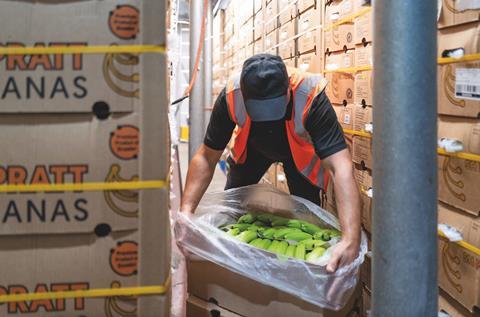SH Pratt Group business unit director João Barata talks to FPJ about the challenges facing the UK banana sector – and how his firm is working to mitigate them

It has been a tough 12 months for the global banana sector. Climate instability – as well as the El Niño phenomenon in Latin America – continues to disrupt the export industry, lowering production and impacting product quality.
Climate crisis
João Barata, business unit director at SH Pratt Group, one of the UK’s leading banana suppliers, says extreme weather patterns have hit banana-growing regions around the world. Some are experiencing drought, he says, while others are suffering from excessive rainfall. At the same time, record temperatures at both ends of the spectrum are messing with yields.
“Dramatically differing temperatures are not good for bananas, which are one of the most temperature-sensitive fruits,” he tells FPJ. “These vastly varying temperatures stress the plantations, affecting the fruit quality and production.”
The global industry anticipates lower banana volumes for the first six months of this year as a result – much to the chagrin of growers.
“If they produce less fruit per hectare, their cost of production rises,” Barata explains. “This is proving problematic for the industry. In addition, the amount of certification growers now need to supply the UK and the European markets means their costs have increased massively.
“It is a difficult situation for the banana industry as there is always significant pressure within the market to reduce costs,” he continues. “However, it is virtually impossible to reduce the price paid to the growers for a box of bananas. This is due to worldwide inflation issues, reduced production, and the living wage requirements, which collectively are having an impact industry-wide.”
Barata is quick to add that SH Pratt Group’s volumes should not be significantly affected since it works with long-established suppliers spread across diverse locations.
“Our company continues to support our growers, and there are strong and long relationships in place,” he says. “Companies that don’t have ongoing contracts, or fail to have strong relationships at source, will struggle to guarantee fruit availability. However, we don’t envisage this will result in empty shelves in the supermarkets.”
Industry challenges
The banana shipping situation, meanwhile, could be compared to a curate’s egg – good in parts. On the plus side, container rates from Latin America to the UK and Europe have significantly reduced, which has had a positive impact on the market. However, ongoing issues in the Panama Canal are severely disrupting exports.
“El Niño and drought have led to the authorities reducing the daily number of shipping vessels by more than 50 per cent, which means delays and higher costs to traverse the canal,” Barata explains.
“All bananas from Ecuador, the biggest global exporter of bananas, are transported via the Panama Canal, and these services call at other ports in Latin America, causing logistics delays and disruptions.
“SH Pratt Group has taken measures to mitigate risks, especially as Ecuador is an important source for us. We have doubled the number of shipping lines we use in 2024, to give us access to more services and guarantee that if something goes wrong, we have more options.”
As well as these transport problems, the global banana industry continues to wrestle with the threat of disease. Tropical Race 4 (TR4) affects bananas in Latin America, Africa and Asia, and its variants can lead to the demise of certain varieties, says Barata.
“There is extensive research into the issue, including establishing a banana variety which will be more resistant to the latest variant/mutation of the disease,” he says. “However, we think climate change is a bigger threat overall to the industry.”
Future-proofing
Nevertheless, SH Pratt Group remains committed to a future in bananas. “We are in a very stable situation and continue to invest in our facilities as we are always looking for new ways to improve,” says Barata.
“We are constantly investing in our ripening rooms to update and modernise our technology systems. We have made significant investments in our operations to ensure we remain as lean as possible, reduce costs, and utilise new systems to make the company as efficient as possible,” he adds.
“These major investments mean we continue to have a significant share of the UK market. And although we are not at 100 per cent capacity, we are not far from it.”
Beyond its UK operations, SH Pratt continues to explore opportunities in Europe, Barata reveals. “Due to our long-established reputation as experts in the sector, we have been involved in consultation projects with different retailers across Europe and have been enlisted to help improve their operations,” he says.
Bananas remain very popular with UK consumers, Barata concludes. “We know that for every 10 customers visiting the supermarket, nine will buy bananas,” he says.



